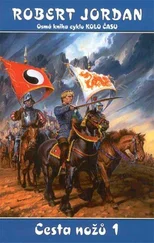As he rode in with his escort, men moved quickly and grimly among the horselines, almost as if the signal to mount had been sounded. More than one had his sword drawn. Voices called to him, but at the sight of a large crowd of men and women, mostly women, gathered in the center of the camp, he felt a sudden numbness inside. He dug in his heels, and Quick sprang forward at a gallop. He did not know whether anyone followed him or not. He heard nothing but the blood pounding in his ears, saw nothing but the crowd in front of his own sharp-peaked tent. The tent he shared with Deira.
He did not rein in on reaching the crowd, just threw himself out of the saddle and hit the ground running. He heard people speak without taking in what they were saying. They parted in front of him, opening a path to his tent, or he would have run over them.
Just inside the tentflaps, he halted. The tent, large enough for twenty soldiers to sleep in, was crowded to the walls with women, wives of nobles and officers, but his eyes quickly found his own wife, Deira, seated on a folding chair in the middle of the carpets that served for a floor, and the numbness faded. He knew she would die one day—they both would—but the only thing he feared was living without her. Then he realized that some of the women were helping her to lower her dress to her waist. Another was pressing a folded cloth to Deira’s left arm, and the cloth was growing red as blood ran down her arm in a sheet and dripped from her fingers into a bowl set on the carpet. There was a considerable amount of dark blood already in the bowl.
She saw him at the same instant, and her eyes flashed in a face that was much too pale. “It comes from hiring outlanders, husband,” she said fiercely, her right hand shaking a long dagger at him. As tall as most men, inches taller than he, and beautiful, her face framed with raven hair winged with white, she had a commanding presence that could become imperious when she was angry. Even when she obviously could barely sit upright. Most women would have been flustered at being bare to the waist in front of so many, with her husband present. Not Deira. “If you did not always insist on moving like the wind, we could have good men from our own estates to do whatever was needful.”
“A dispute with servants, Deira?” he said, cocking an eyebrow. “I never thought you’d start taking knives to them.” Several of the women gave him cool, sidelong glances. Not every man and wife dealt together as he and Deira did. Some thought them odd, since they seldom shouted.
Deira scowled at him, then grunted a short, involuntary laugh. “I will start at the beginning, Davram. And go slowly, so you can understand,” she added with a small smile, pausing to thank the women who draped a white linen sheet around her bare torso. “I returned from my ride to find two strange men ransacking our tent. They drew daggers, so naturally, I hit one of them with a chair and stabbed the other.” She directed a grimace at her cut arm. “Not well enough, since he managed to touch me. Then Zavion and some of the others came in, and the pair fled through a slit they had made in the rear of the tent.”
Several of the women nodded grimly and gripped the hilts of the daggers they all wore. Until Deira said darkly, “I told them to give chase, but they insisted on tending my scratch.” Hands dropped away from hilts, and faces colored, though none looked in the least apologetic for disobeying. They had been in a ticklish position. Deira was their liege lady as he was their liege lord, but whether or not she called it a scratch, she could have bled to death if they had left her to go chasing the thieves. “In any event,” she went on, “I ordered a search. They won’t be hard to find. One has a lump on his head, and the other is bleeding.” She gave a sharp, satisfied nod.
Zavion, the sinewy, red-haired Lady of Gahaur, held up a threaded needle. “Unless you have taken up an interest in embroidery, my Lord,” she said coolly, “may I suggest that you withdraw?”
Bashere acquiesced with a small bow of his head. Deira never liked him to watch her being sewn up. He never liked watching her being sewn up.
Outside the tent, he paused to announce in a loud voice that his lady wife was well and being tended, and that they should all go on about their business. The men departed with wishes for Deira’s well being, but none of the women stirred a foot. He did not press them. They would remain until Deira herself appeared, whatever he said, and a wise man tried to avoid battles he would not only lose, but look foolish losing.
Tumad was waiting on the edge of the crowd, and he fell in beside Bashere, who walked with his hands clasped tightly behind his back. He had been expecting this, or something like, for a long time, but he had almost begun to think it would not happen. And he had never expected Deira to nearly die because of it.
“The two men have been found, my Lord,” Tumad said. “At least, they apparently meet the description the Lady Deira gave.” Bashere’s head jerked around, murder on his face, and the younger man quickly added, “They were dead, my Lord, just outside the camp. Each got one thrust with a narrow blade.” He stabbed a finger at the base of his skull, just behind the ear. “It had to be more than one did it, unless he was faster than a rock viper.”
Bashere nodded. The price of failure often was death. Two to search, and how many to silence them? How many remained, and how long before they tried again? Worst of all, who was behind it? The White Tower? The Forsaken? It seemed a decision had been reached for him.
No one except Tumad was close enough to hear him, but he spoke softly anyway, and chose his words cautiously. Sometimes, the price of carelessness was death, too. “You know where to find the man who came to me yesterday? Find him, and tell him I agree, but there will be a few more than we talked about.”
The light feathery snow falling on the city of Cairhien dimmed the morning sunlight only a little, just muting the brightness. From the tall narrow window in the Sun Palace, fitted with a casement of good glass panes against the cold, Samitsu could see clearly the wooden scaffolding erected around the ruined section of the palace, broken cubes of dark stone still littered with rubble and stepped towers that stopped abruptly short of equaling the rest of the palace’s towers. One, the Tower of the Risen Sun, was simply no longer there. Several of the city’s fabled “topless” towers loomed through the drifting white flakes, enormous square spires with huge buttresses, much taller by far than any in the palace despite its location on the highest hill in a city of hills. They were wrapped in their own scaffolds and still not completely rebuilt twenty years after the Aiel had burned them; another twenty might see them done. There were no workmen clambering along the planks on any of the scaffolding, of course, not in this weather. She found herself wishing the snow could give her a respite, too.
When Cadsuane departed a week past, leaving her in charge, her task had appeared straightforward. Make sure the Cairhienin pot did not begin to boil again. That had appeared a simple task at the time, though she had seldom dabbled in politics to speak of. Only one noble retained sizable forces under arms, and Dobraine was cooperative, for the most part, seeming to want everything kept quiet. Of course, he had accepted that fool appointment as “Steward of Cairhien for the Dragon Reborn.” The boy had named a “Steward” of Tear, too, a man who had been in rebellion against him a month gone! If he had done as much in Illian… It seemed all too probable. Those appointments would cause no end of trouble for sisters to sort out before all was said and done! The boy brought nothing but trouble! Yet so far Dobraine seemed to be using his new post only to run the city. And to quietly rally support for Elayne Trakand’s claim to the Sun Throne, if she ever made one. Samitsu was satisfied to leave it at that, not caring one way or another who took the Sun Throne. She did not care much for Cairhien at all.
Читать дальше












